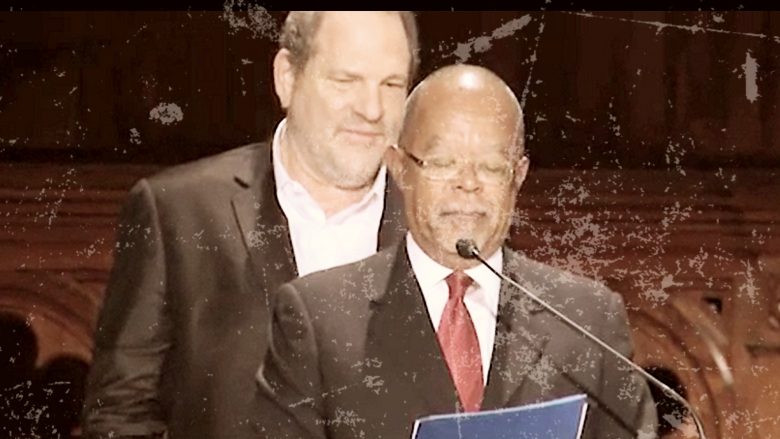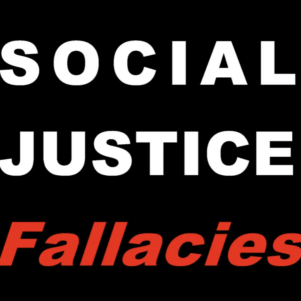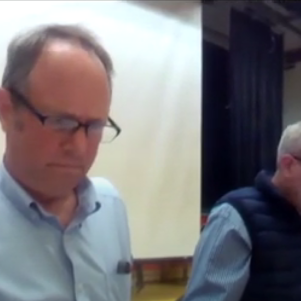When Will Harvard Rescind Social Justice Medal Awarded to Hollywood’s Harvey Weinstein?
By Evan Lips | October 16, 2017, 5:21 EDT
 Embattled Hollywood producer Harvey Weinstein (rear) is honored at Harvard University in 2014 by Professor Henry Louis “Skip” Gates, director of the Hutchins Center for African and African American Research.
Embattled Hollywood producer Harvey Weinstein (rear) is honored at Harvard University in 2014 by Professor Henry Louis “Skip” Gates, director of the Hutchins Center for African and African American Research. CAMBRIDGE — A state university in New York that disgraced Hollywood mogul Harvey Weinstein once attended has initiated the process of revoking the honorary degree it gave him more than 17 years ago.
The question now is whether Harvard University will follow the lead of the State University of New York at Buffalo and rescind the W.E.B. Du Bois Medal that the elite institution’s Hutchins Center for African & African American Research bestowed upon him in 2014.
The Democratic Party mega-donor was one of eight individuals honored with the prestigious medal that year. He shared the stage with fellow honorees like poet and activist Maya Angelou, calypso artist Harry Belafonte, civil rights icon and Georgia U.S. Representative John Lewis, and television legend Oprah Winfrey.
“For me, being at Harvard is amazing,” Weinstein said during his acceptance remarks, which have been preserved by way of a video that as of Sunday night is still available to watch online at the Hutchins Center website. “My mom’s 87 years old, she always wanted us to be doctors or lawyers, and look what happened.
“And now, I can tell her honestly, ‘Hey Mom, I got an award at Harvard’.”
Earlier this month the New York Times dropped a bombshell report alleging that Weinstein had been paying off aspiring and current actresses for decades in order to keep them from reporting sordid instances of sexual harassment — allegations that include Weinstein asking them to watch him take showers, instructing them to massage him, and even in some cases, according to accusers, raping them.
The reports involving Weinstein promptly snowballed, with allegations of intimidation, payoffs, and threats of legal action. Journalist Ronan Farrow, the son of actress Mia Farrow, attempted to produce his own report documenting Weinstein’s dealings, only to be turned down by NBC, his employer at the time.
Farrow wound up paying a production crew to help him document his work — which included damning audio he obtained from the New York City Police Department, and successfully shopped the story to The New Yorker.
Weinstein reportedly left the country last week, flying to Europe to check himself into a sex offender rehab clinic. There are reports that Weinstein could potentially face criminal charges.
There are zero reports, however, of Harvard rescinding the medal the university awarded Weinstein, one named after W.E.B. Du Bois (1868-1963), who was born in Great Barrington, Massachusetts, became the first African-American to earn a doctorate from Harvard, and went on to lay the groundwork for the civil rights movement.
The Harvard Gazette, which bills itself as the “official news site” of Harvard University, described the 2014 W.E.B. medal ceremony as an evening that featured “powerful voices” and noted that Congressman Lewis, the non-arts recipient, could not be honored the previous year “due to the government shutdown.” The 2014 ceremony also honored English filmmaker Steve McQueen, director of the docudrama 12 Years a Slave.
The Harvard Gazette promoted the event by invoking Michael Brown, the 18-year-old black robbery suspect shot and killed by a white police officer in Ferguson, Missouri in August 2014:
Recalling the death of Michael Brown in Ferguson, Mo., Lewis F. and Linda L. Geyser University Professor William Julius Wilson said that McQueen’s films address contemporary questions of “How does a black person move through the world when that world is predisposed to prejudice?”
“For me, art has always been about creating debate,” said McQueen, who said he wants his work to resonate with audiences, for his films to be conversations.
“The experience has to linger,” he said. “My only commitment — my only doctrine — is to not let the dust settle.”
Weinstein’s remarks during the Hutchins Center awards ceremony September 30, 2014 cited McQueen’s dust-settling reference.
At one point Weinstein also mentioned his father, and spoke about one of the founding principles he tried to instill in the film company he established with his brother, Miramax, and later in The Weinstein Company.
“He taught us two things, to always fight for justice and fight for what you believe, so I’m going to give you the motto of our company for all these years — it’s a paraphrase of Kurt Vonnegut’s Cat’s Cradle: Good can triumph over evil if the angels are as organized as the Mafia.”
According to the evening’s awards program, Weinstein was selected as an honoree for his eagerness to produce films that explored themes related to social justice and the struggles of African-Americans.
Professor Henry Louis “Skip” Gates Jr., director of the Hutchins Center, praised Weinstein.
“He has the keenest ear and eye for the words and pictures that entertain us and challenge us, that make us laugh and make us cry,” Gates said about Weinstein. “His belief in the power of film has brought new voices and new visions to the fore.
“For this, the W.E.B. Du Bois medal recognizes Harvey Weinstein.”
Here’s @HenryLouisGates of #Harvard honoring #HarveyWeinstein w WEB Du Bois medal, will school rescind? Story coming via @NewBostonPost pic.twitter.com/WATfCLtS2t
— Evan Lips (@evanmlips) October 16, 2017
Gates did not immediately respond to a New Boston Post inquiry sent Sunday evening via email, asking whether the Hutchins Center plans to rescind the medal. A Newsweek report published last Wednesday documenting SUNY-Buffalo’s decision to revoke Weinstein’s honorary degree noted Harvard’s awarding of the W.E.B. Du Bois medal to Weinstein, and likewise added that Harvard did not respond to the magazine’s request for comment.
Weinstein’s appearance and subsequent award at Harvard in 2014 barely created a ripple of news at the time. Other than a Harvard Crimson recap, the Boston Globe was the only other news outlet to publish a record of Weinstein’s Harvard achievement, but inaccurately claimed there were nine medal recipients instead of the eight honored at the event.
Just weeks ago, hip-hop star LL Cool J and former interim Democratic National Committee chairman Donna Brazile — who made national headlines last fall after emails leaked showing she had secretly provided premature CNN Democratic primary debate questions to Democratic presidential candidate Hillary Clinton, while employed as a CNN analyst — were the 2017 recipients of the W.E.B. Du Bois medal.
Meanwhile, perhaps the most passionate remarks delivered during the 2014 ceremony came from Diane Paulus, artistic director of the Harvard-affiliated American Repertory Theater. Paulus introduced Weinstein, as she had previously worked with Weinstein on the set of Finding Neverland, the 2004 Peter Pan musical biopic of playwright J.M. Barrie.
Her remarks take on added significance considering Weinstein, weeks before the New York Times report hit, made headlines for allegedly negotiating an agreement with fashion titan Kenneth Cole, convincing him to redirect $600,000 earned from an item auctioned off at an AIDS research fund raiser towards Paulus’s American Repertory Theater.
According to reports, four board members from amFaR, the nonprofit Foundation for Aids Research that is chaired by Cole, have alerted New York Attorney General Eric Schneiderman. The unnamed auction item itself was sold for a total sum of $900,000.
Belafonte also serves on amfAR’s board. Belafonte reportedly backed the decision to re-direct the money away from AIDS research and to the American Repertory Theater.
During the 2014 ceremony Paulus ticked off in her remarks at the W.E.B. Du Bois medal ceremony some of Weinstein’s most well-known productions, including the films Good Will Hunting, Fahrenheit 9/11, and Pulp Fiction — along with award-winning films exploring issues of race and social justice like Mandela: Long Walk to Freedom, The Butler, Fruitvale Station, 20 Feet From Stardom, and Django Unchained.
“My good friend Skip Gates says ‘no one has done more for black films and filmmakers than Harvey Weinstein’,” Paulus said at one point. “Even if I wanted to argue with Skip, which I never do, I couldn’t on this point.”
And here is #HarveyWeinstein accepting @Harvard social justice award, will they rescind? Story coming via @NewBostonPost #BlackLivesMatter pic.twitter.com/OCKVygi84M
— Evan Lips (@evanmlips) October 16, 2017
One of the films Paulus did not mention in her remarks ahead of introducing Weinstein was the controversial documentary known as The Hunting Ground, a 2015 film bankrolled in part by Weinstein that purports to show that rape and sexual assault on America’s college campuses — especially Harvard’s — are out of control.
Paulus did not immediately respond to requests for comment made by email and voice mail Sunday evening by New Boston Post. On Monday morning a theater directed New Boston Post’s inquiry to a prepared statement regarding Weinstein that Paulus apparently released last week:
“While I never experienced this side of Harvey in my working relationship with him, I am appalled by his behavior, and I stand strongly with all of the women who have had the courage to come forward.”
During her remarks at the award ceremony in 2014, Paulus talked about the work relationship she shared with Weinstein. She praised Weinstein’s penchant for producing films featuring “storytelling characterized by complexity, nuance and honesty.”
“Nowhere,” she said, “are these characteristics more evident than in my collaboration with Harvey on Finding Neverland, which has been one of the most rewarding artistic experiences of my life.”
Finding Neverland, according to the Harvard Gazette report, enjoyed a theatrical run in Cambridge at the American Repertory Theater before landing on Manhattan’s Broadway. Actress Kate Winslet, who landed a starring role in the Weinstein-backed Best Picture-nominated film version, later won an Academy Award for her role in 2009 in another Weinstein production, The Reader. According to a Los Angeles Times report published over the weekend, Winslet, who didn’t offer any thanks to Weinstein in her Oscar acceptance speech, told the newspaper that the decision to omit Weinstein “was deliberate.”
According to Winslet:
“I remember being told, ‘Make sure you thank Harvey if you win.’ And I remember turning around and saying, ‘No I won’t. No I won’t.’ And it was nothing to do with not being grateful. If people aren’t well-behaved, why would I thank him?
“The fact that I’m never going to have to deal with Harvey Weinstein again as long as I live is one of the best things that’s ever happened and I’m sure the feeling is universal.”
During her introductory remarks, Paulus delved into her experiences working with Weinstein.
“Everyone wants to know what it is like working with Harvey Weinstein. I am sure you would not be surprised if I told you working with Harvey is intense, at times overwhelming, and requires nerves of steel. I think he has told me, I think he has, had to take, some serious patience pills, since he has told me on numerous occasions that he could make 10 films in the time it takes to create one musical.”
Paulus called the 2014 event a “deeply inspiring ceremony” and later expounded upon her experience making Finding Neverland with Weinstein, connecting it to his family life:
“A place full of pirates, fairies, crocodiles, mermaids, and boys who would never grow up, Finding Neverland is a story about family, love, and I have learned, that Harvey’s family life, especially Georgina [Chapman] and his children, are at the center of his universe. And perhaps, most delightfully, Finding Neverland is a love letter to the theater, and Harvey loves the theater.”
Chapman reportedly left Weinstein last week.
Paulus also touched on how she believed, at the time, that there would be more opportunities to work with Weinstein.
“Lucky for me that I am on a long journey with Harvey, because it means I continue to have the opportunity to learn from him,” she said.
Paulus, in noting that Weinstein was being honored that night “for his significant and groundbreaking contributions to the film industry,” also claimed that more good fortune was likely in store for Weinstein, who she described as “my collaborator and my friend.”
“He is only beginning his journey as a creative producer of the theater,” she said.
As for Weinstein, he ended his remarks by telling his colleagues on stage — mentioning Belafonte specifically — that “when the dust flies, I’ll be right there with you” — a reference to the 12 Years a Slave director McQueen’s comments to the Harvard Gazette, where he indicated his refusal to “let the dust settle.”
Full video of Weinstein’s remarks:











